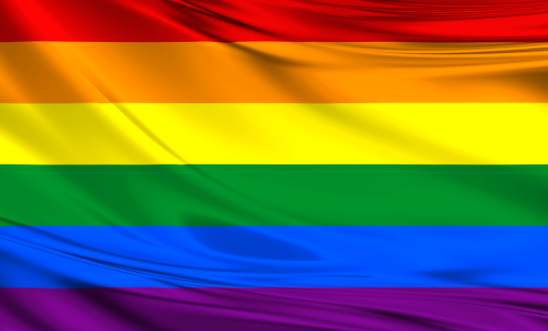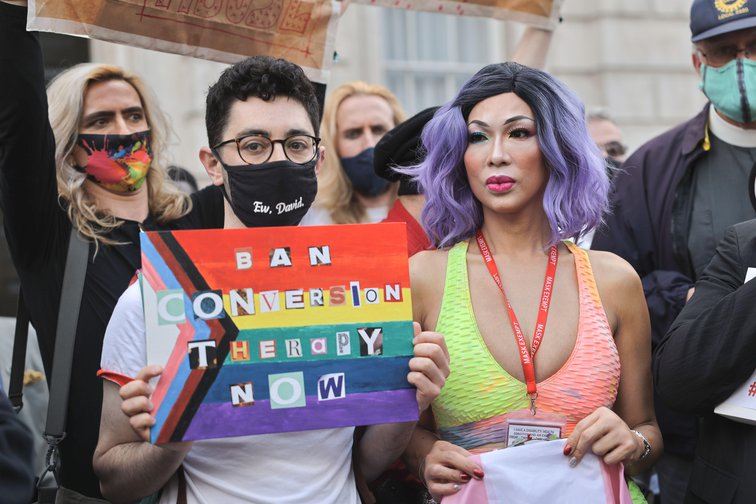UK: Conversion therapy ban without trans and non-binary people is 'not a real ban'

In response to news of the UK government’s ban on ‘conversion therapy’ to go ahead but not cover trans or non-binary people, Lydia Parker, Amnesty International UK’s Programme Director, said:
“Conversion therapy is an abhorrent practice which tells LGBTI+ people they are ‘sick’ and ‘broken’.
“Such so-called ‘therapy’ can constitute torture or cruel, inhuman and degrading treatment and should be stamped out now with no excuses.
“A ban on conversion therapy that is not LGBTI+ inclusive is not a real ban on conversion therapy. Trans and non-binary people also need to be protected from this dangerous practice.
“Conversion therapy has no place anywhere in our society and we will continue to press for comprehensive bans in all parts of the UK.”
Revealed: Groups linked to anti-trans lobbying met Kemi Badenoch after privately urging equalities minister to drop conversion therapy ban
Adam Ramsay
1 April 2022

Activists hand in a letter to the Cabinet Office calling for a ban on conversion therapy, 2021 |
ZUMA Press Inc / Alamy Stock Photo
A group that campaigns against trans rights has claimed credit for a government U-turn on ‘conversion therapy’ – as documents released to openDemocracy reveal its behind-the-scenes lobbying.
The LGB Alliance says it met with government ministers Mike Freer and Baroness Stedman-Scott in January this year to express “concerns” about the outlawing of the practice. Ministers had been pledging to ban it since 2018 – but, last night, ITV News revealed that the government now intends to exempt transgender people from protections.
Papers released to openDemocracy under the Freedom of Information Act show the LGB Alliance had earlier met with the equalities minister Kemi Badenoch in July 2020 after writing to her to argue against a ban on conversion therapy. But the government refused to disclose who was there, say what was discussed, or provide papers from the meeting.
Addressing Badenoch ahead of the meeting, the charity claimed that educational material relating to gender identity was “confusing” and said allowing trans people to self-identify was “harmful”.
In a separate briefing two months later, the organisation suggested to Badenoch that it should not be considered “conversion therapy” for psychotherapists to “examine” the “reasons” for young people being trans – an apparent precursor to the government’s decision to exempt anti-trans conversion therapy from its ban.
The LGB Alliance was founded in 2019 to oppose what it calls “gender ideology”, and has been called a ‘hate group’ by figures including Pride in London, Green Party co-leader Carla Denyer and the gay commentator Owen Jones. The organisation denies being transphobic but it has referred to trans women as “males identifying as females”. It was condemned by other LGBTIQ+ charities as “divisive and polarising”, and came under fire last year for apparently comparing LGBTIQ+ inclusion to bestiality.
Its founder Bev Jackson said in 2020 that she was “building an organisation to challenge the dominance of those who promote the damaging theory of gender identity”, while the organisation has similarly claimed that lesbian, gay and bisexual people’s “interests” are “under threat” from “attempts to introduce confusion between biological sex and the notion of gender”.
openDemocracy analysis of data released by the government additionally shows that the equalities minister had at least three further meetings with people or groups linked to anti-trans campaigning in the two years preceding the U-turn.
NHS England, in line with other expert bodies, has described all forms of conversion ‘therapy’ as ‘harmful’
Badenoch also met with Keira Bell and Paul Conrathe in May 2021 “to discuss how the proposed conversion therapy bill will effect [sic] under 18s questioning their gender,” according to government documents. Bell has made headlines as a rare example of someone who has ‘detransitioned’, and has campaigned to restrict the ability of other young people to access puberty blocking drugs. Conrathe is a lawyer and as well as working on Bell’s case against the clinic that treated her has also previously worked for anti-abortion groups. Twenty years ago, he opposed the equalisation of the age of consent for homosexual activity.
Finally, data released by the government also shows that ministers met with academic Anastassis Spiliadis last summer to discuss the impact of a ban on conversion therapy. Spiliadis’ research has been endorsed by the group Transgender Trend, which today hailed the conversion therapy U-turn and has previously been criticised by LGBTIQ+ charity Stonewall for “trying to spread damaging myths, panic and confusion” among young people.
Ministers also met with groups supportive of trans rights and the banning of conversion therapy, including Stonewall, the Conversion Therapy Surivors Group and the UK Council for Psychotherapy.
NHS England, in line with other expert bodies, has described all forms of conversion ‘therapy’ as ‘harmful’. The practice (also called ‘reparative therapy’ or ‘gay cure therapy’) refers to any therapeutic approach or view that assumes one sexual orientation or gender identity is innately preferable to another, and attempts to change someone’s sexual orientation or gender identity on that basis. In practice, this means changing people’s orientation or identity to cisgender heterosexuality.
Trans people twice as likely to be targeted
Stonewall CEO Nancy Kelley said: “After years of delay, in which LGBTQIA+ people across the UK have continued to suffer as a consequence of conversion practices, it is devastating that the UK government is breaking its promise to implement an inclusive ban that protects all our communities from abuse. Trans people are nearly twice as likely to be targeted by conversion practices and any ban that is not trans-inclusive abandons those that are most at risk.
“Countries around the world are acting to ban this homophobic, biphobic and transphobic abuse, and it is shameful that the UK government is choosing which LGBTQIA+ people deserve protection. We call on the governments of Wales and Scotland to protect all our communities and make good on their promise to end conversion practices in their own jurisdictions, and on the government of the UK to change its stance on protecting trans people.”
LGBTQ rights campaigner Peter Tatchell told openDemocracy: “It seems very likely that the government was influenced by these trans-hostile lobbyists to abandon its original intention for a comprehensive trans-inclusive prohibition on conversion practices.”
He added: “10 Downing Street has been captured by the anti-trans lobby. This calls into question the prime minister’s commitment to the equality laws that explicitly protect trans people.”
Explainer: What is ‘conversion therapy’?
The UK government has reportedly stepped back from including protections for trans people in its banning of conversion therapy.
Here's what you need to know
Kerry CullinanKhatondi Soita Wepukhulu
1 April 2022, 
Illustration: Inge Snip
'Conversion therapy’ claims to change a person’s sexual orientation, gender identity or gender expression.
The UK had pledged to outlaw it in England and Wales – but, on 31 March 2022, was reported to have stepped back from including protections for trans people. Elsewhere, Brazil, Ecuador, Germany and Malta have banned these practices, which range from ‘talk therapy’ to physical ‘treatments’. Several US states have done the same.
International health and human rights experts have condemned these treatments as “harmful” and “ineffective”. But they remain common in many places globally. A six-month investigation by openDemocracy in 2021 revealed that health centres in Uganda, Kenya and Tanzania – including some funded by foreign aid money – had offered or referred undercover reporters to providers of such anti-gay ‘therapy’.
If you haven’t heard of ‘conversion therapy’ before, here’s what you need to know.
What is conversion therapy?
The phrase ‘conversion therapy’ – sometimes also called ‘reparative therapy’ or ‘gay cure’ – is used to describe a range of practices to change, suppress or divert a person’s sexual orientation or gender identity. Medical experts say the basic concept is meaningless: LGBTIQ identities are not diseases, and cannot be ‘changed’ via any psychological or physical ‘therapy’.
The American Academy of Child and Adolescent Psychiatry says there is “no evidence to support the application of any ‘therapeutic intervention’ operating under the premise that a specific sexual orientation, gender identity, and/or gender expression is pathological”, and ‘conversion therapies’ “lack scientific credibility and clinical utility”.
Is it always physically violent?
No. You might have heard about the use of electric shocks, but ‘conversion therapy’ practices vary widely. They range from ‘talk therapy’, involving counselling, psychotherapy and faith-based interventions such as prayer, to physical ‘aversion therapy’, where the person is simultaneously subjected to a distressing sensation and a stimulus they associate with their sexuality or gender identity. Torture is also used, including so-called corrective rape.
Is it new?
While homosexuality has been stigmatised over time in many societies, Western scientists began to see it as a medical ‘disorder’ that could be ‘reversed’ in the late 19th century. Since then, LGBTIQ people have been subjected to many experiments. In the 1940s, homosexuality and ‘gender incongruence’ were classified as mental illnesses by Western medical associations, which spurred more efforts to find ‘cures’.
The rise of the gay rights movement in the 1960s and ’70s challenged these notions and practices, and the American Psychiatric Association (APA) removed homosexuality from its lists of mental illnesses in 1973. According to a 2020 report by the International Lesbian, Gay, Bisexual, Trans and Intersex Association (ILGA), more than 60 medical associations globally have condemned ‘conversion therapy’.
Does it work?
No. Numerous medical groups, including the APA, have questioned the efficacy and evidence for such ‘treatments’. The APA says that attempts to change an individual’s sexual orientation “may occasionally result in temporary behavioural changes for some […] for limited periods of time, but that such changes are often accompanied by depression, anxiety, and other symptoms”. For others, no changes happen.
Who provides ‘conversion therapy’?
In some countries, public and private medical establishments still provide ‘conversion therapy’ – as evidenced by openDemocracy’s investigation. In others, religious organisations have largely taken over this role, offering ‘therapy’ that usually involves prayer – often in publicly humiliating ways – as well as ‘counselling’.
Who undergoes ‘conversion therapy’?
Lesbian, gay, bisexual, transgender, intersex and queer (LGBTIQ) people undergo ‘conversion therapy’ practices in an attempt to modify, suppress or change their sexual orientation or gender identity to cis gender heterosexuality.
Are people forced to undergo this?
LGBTIQ people are often encouraged or pressured to undergo ‘conversion therapy’ by family members. We interviewed, in collaboration with local researchers, more than 50 survivors of these ‘treatments’ in Uganda, Kenya and Tanzania. Some said that their families threatened their safety, threatened to denounce them publicly or to stop paying their school fees if they did not agree to having this ‘therapy’.
Some LGBTIQ people choose to undergo ‘conversion therapy’ themselves, which is a “manifestation of the scourge of both societal and internalised homophobia and transphobia”, according to the human rights group OutRight Action International.
What are the consequences of ‘conversion therapy’?
Practices to change one’s gender and sexuality are “inherently degrading and discriminatory” said Kaajal Ramjathan-Keogh, Africa director at the human rights NGO the International Commission of Jurists.
Research has shown that these practices have lasting psychological effects. A 2018 US study found that young LGBTIQ people who reported undergoing 'conversion therapy' were “more than twice as likely to report having attempted suicide”.
Do any organisations support survivors of ‘conversion therapy’?
LGBTIQ people in East Africa who have undergone ‘conversion therapy’ and are seeking support can contact The Taala Foundation (Uganda), The Gay and Lesbian Coalition of Kenya (GALCK) and LGBT Voice (Tanzania).
Editor's note: This explainer on conversion therapy was originally published in July 2021. In the wake of news about the UK government's partial U-turn on banning the practice in England and Wales, we have republished it with minor amendments.
No comments:
Post a Comment